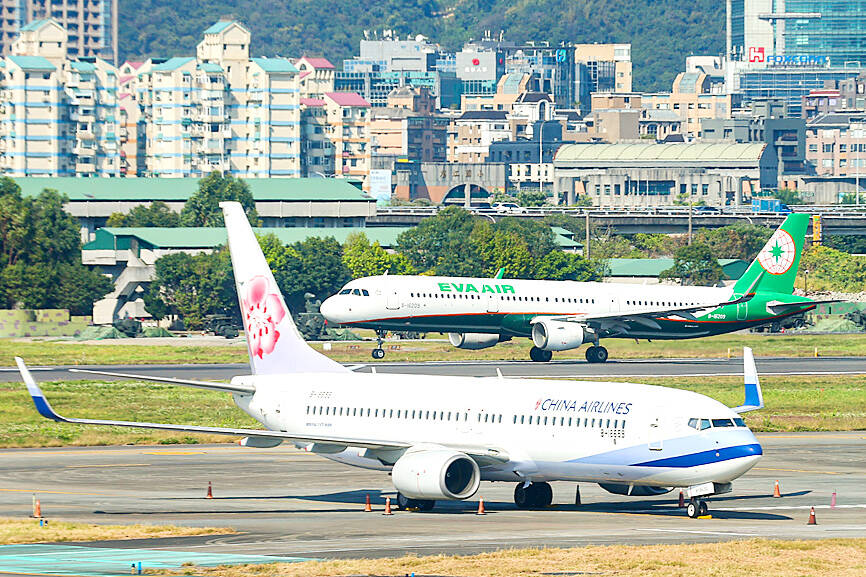China Airlines Ltd (華航) yesterday reported net profit for last year of NT$2.85 billion (US$92.5 million), down 70 percent from a year earlier, as rising operational costs weighed on its profitability.
That translated into earnings per share of NT$0.48, the nation’s flag carrier said.
Despite lower air cargo rates and intensifying competition in the passenger market, China Airlines’ revenue grew 8.5 percent annually to NT$150 billion last year, attributable to higher ticket prices in the passenger market and robust demand from consumers in the second half of the year, it said.

Photo: CNA
However, an increase in operational costs of 20 percent outpaced revenue growth, with costs totaling NT$139 billion, as aviation fuel costs increased 70 percent year-on-year, halving the airline’s gross margin from a year earlier, company data showed.
The airline said that its passenger revenue expanded 320 percent from a year earlier as Taiwanese airports resumed transit services in June last year and the government relaxed the nation’s border controls in October, the company said in a statement.
Its cargo revenue fell about 7 percent from a year earlier in light of competition from sea shippers, the company said.
China Airlines said it is upbeat about the passenger market this year and would increase the number of flights to earn more passenger revenue.
From later this month, the airline would provide more than 150 flights per week from Taiwan to Japan and South Korea, two of the favorite markets of Taiwanese travelers, it said.
The airline said it is planning to use wide-body Airbus SE 321neo aircraft for its Southeast Asian flights to gain more market share.
As it is planning to expand its offering of long-haul services, it would from next month increase the number of flights to Vienna and London, China Airlines said.
Passenger numbers on flights to North America have recovered to pre-COVID-19 pandemic levels, it added.
The company said it would take delivery of two new Boeing 777F jets to boost its efficiency, adding that it is planning to increase its flights to the US and Europe to maximize its air cargo revenue.
In related news, freight forwarder and logistics operator T3EX Global Holdings Corp (台驊國際投資控股) yesterday reported net income of NT$2.54 billion for last year, down 35 percent from a year earlier, as revenue fell 22 percent amid weaker demand.
T3EX Global’s earnings per share were NT$18.03, compared with NT$30.03 a year earlier, company data showed.

INVESTMENT: Jun Seki, chief strategy officer for Hon Hai’s EV arm, and his team are currently in talks in France with Renault, Nissan’s 36 percent shareholder Hon Hai Precision Industry Co (鴻海精密), the iPhone maker known as Foxconn Technology Group (富士康科技集團) internationally, is in talks with Nissan Motor Co’s biggest shareholder Renault SA about its willingness to sell its shares in the Japanese automaker, the Central News Agency (CNA) said, citing people it did not identify. Nissan and fellow Japanese automaker, Honda Motor Co, are exploring a merger that would create a rival to Toyota Motor Corp in Japan and better position the combined company to face competitive challenges around the world, people familiar with the matter said on Wednesday. However, one potential spanner in the works is

SEMICONDUCTORS: Samsung and Texas Instruments would receive US$4.75 billion and US$1.6 billion respectively to build one chip factory in Utah and two in Texas Samsung Electronics Co and Texas Instruments Inc completed final agreements to get billions of US dollars of government support for new semiconductor plants in the US, cementing a major piece of US President Joe Biden administration’s CHIPS and Science Act initiative. Under binding agreements unveiled Friday, Samsung would get as much as US$4.75 billion in funding, while Texas Instruments stands to receive US$1.6 billion — money that would help them build facilities in Texas and Utah. The final deals mean the chipmakers can begin collecting the funding when their projects hit certain benchmarks. Though the terms of Texas Instruments’ final agreement is

Call it an antidote to fast fashion: Japanese jeans hand-dyed with natural indigo and weaved on a clackety vintage loom, then sold at a premium to global denim connoisseurs. Unlike their mass-produced cousins, the tough garments crafted at the small Momotaro Jeans factory in southwest Japan are designed to be worn for decades, and come with a lifetime repair warranty. On site, Yoshiharu Okamoto gently dips cotton strings into a tub of deep blue liquid, which stains his hands and nails as he repeats the process. The cotton is imported from Zimbabwe, but the natural indigo they use is harvested in Japan —

Japan ramped up its warnings against currency speculation on Friday after the yen slid to a five-month low following a hint from the central bank chief that he might wait longer than expected before raising interest rates. “The government’s deeply concerned about recent currency moves, including those driven by speculators,” Japanese Minister of Finance Katsunobu Kato said. “We will take appropriate action if there are excessive moves in the currency market.” The yen regained some ground against the dollar after Kato’s remarks, strengthening to as much as ¥156.89 after earlier weakening to ¥157.93. The Japanese currency strengthened a little further after currency